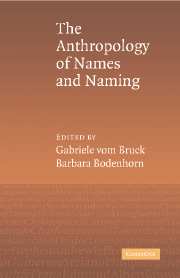Book contents
- Frontmatter
- Contents
- Contributors
- Preface and Acknowledgments
- 1 “Entangled in Histories”: An Introduction to the Anthropology of Names and Naming
- 2 “Your Child Deserves a Name”: Possessive Individualism and the Politics of Memory in Pregnancy Loss
- 3 Why the Dead Do Not Bear Names: The Orokaiva Name System
- 4 The Substance of Northwest Amazonian Names
- 5 Teknonymy and the Evocation of the “Social” Among the Zafimaniry of Madagascar
- 6 What's in a Name? Name Bestowal and the Identity of Spirits in Mayotte and Northwest Madagascar
- 7 Calling into Being: Naming and Speaking Names on Alaska's North Slope
- 8 On Being Named and Not Named: Authority, Persons, and Their Names in Mongolia
- 9 Injurious Names: Naming, Disavowal, and Recuperation in Contexts of Slavery and Emancipation
- 10 Where Names Fall Short: Names as Performances in Contemporary Urban South Africa
- 11 Names as Bodily Signs
- Bibliography
- Index
6 - What's in a Name? Name Bestowal and the Identity of Spirits in Mayotte and Northwest Madagascar
Published online by Cambridge University Press: 17 August 2009
- Frontmatter
- Contents
- Contributors
- Preface and Acknowledgments
- 1 “Entangled in Histories”: An Introduction to the Anthropology of Names and Naming
- 2 “Your Child Deserves a Name”: Possessive Individualism and the Politics of Memory in Pregnancy Loss
- 3 Why the Dead Do Not Bear Names: The Orokaiva Name System
- 4 The Substance of Northwest Amazonian Names
- 5 Teknonymy and the Evocation of the “Social” Among the Zafimaniry of Madagascar
- 6 What's in a Name? Name Bestowal and the Identity of Spirits in Mayotte and Northwest Madagascar
- 7 Calling into Being: Naming and Speaking Names on Alaska's North Slope
- 8 On Being Named and Not Named: Authority, Persons, and Their Names in Mongolia
- 9 Injurious Names: Naming, Disavowal, and Recuperation in Contexts of Slavery and Emancipation
- 10 Where Names Fall Short: Names as Performances in Contemporary Urban South Africa
- 11 Names as Bodily Signs
- Bibliography
- Index
Summary
A rose by any other name would smell as sweet; Rose Macaulay, if called by her parents Gladys, would have been the same person and written the same books; a deity by any other name might remain as terrifying, loving, unpredictable, or as some Hindus and Malagasy say, as fragrant (Malg. Andriamañitry). But flowers, persons, and deities are not the same order of phenomena. Roses – despite the multiplication of varieties as the logic of commodities usurps natural selection – are roses, and – despite the intensive labor and exposure to toxic chemicals now necessary to make them flourish – are roses. Persons are somewhat more complex referents than roses and both require and resist being named. Deities, although often usefully understood as persons, are not the same as existential human beings. How different is the importance of a deity or spirit's name to its identity? In this paper I explore the question, drawing on the ethnography of spirit possession found among Malagasy speakers of Mayotte and northwest Madagascar.
The spirits in question engage in long-term relationships with specific human hosts and rise periodically to speak and act through them (Lambek 1981, 1993, 2002). During moments of active possession, which can last up to several hours, hosts are in a state of trance (or dissociation), said to be temporarily absent from or out of control of their bodies.
- Type
- Chapter
- Information
- An Anthropology of Names and Naming , pp. 115 - 138Publisher: Cambridge University PressPrint publication year: 2006



